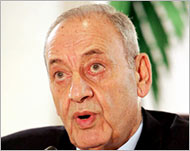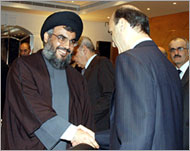Lebanese leaders try to bridge gaps
Lebanon’s rival leaders have agreed to let the government resolve the contentious issue of the assassination of Rafiq al-Hariri, the former prime minister, so they can focus on other thorny issues.

Those issues include the fate of the pro-Syrian president and the weapons of Hizb Allah fighters.
The leaders – Muslim and Christian, pro- and anti-Damascus – came together for the first time in an effort to overcome the country’s deep divisions since the end of Syrian domination.
A UN team is investigating last year’s truck bombing that killed al-Hariri and 20 others, and the government has demanded an international tribunal to try the suspects in the case.
It also sought the UN team’s help in investigating the spate of bombings that hit Lebanon since October, killing in all 33 people.
Many in Lebanon blame Damascus for the attacks, but it has denied any involvement.
Pro-Syrian factions, some of which are represented in the Lebanese cabinet, originally objected to expanding the al-Hariri investigation and to forming an international tribunal, but the government voted for it anyway.
Thursday’s decision appears to settle the matter.
Berri’s initiative
Nabih Berri, the pro-Syrian parliament speaker who called the conference, said: “It was unanimously decided that the decisions of the government pertaining to this (assassination) and related issues … be followed up by the Lebanese government.”
But the leaders may not be able to bridge a gulf that remains wide over other issues and tough bargaining was expected over renewed calls by the anti-Syrian coalition for Emile Lahoud’s resignation and for Hizb Allah to disarm.
 |
|
Nabih Berri: The talks ended |
Those issues could derail the most serious attempt to reach a compromise solution to Lebanon’s worst political crisis since the end of the 1975-90 civil war.
About 35 leaders and aides gathered in the first meeting of its kind since the end of nearly three decades of Syrian control, with Damascus’ troop withdrawal following mass protests sparked by al-Hariri’s assassination on 14 February 2005.
Reporters were not allowed into the building. Pictures showed the leaders smiling and shaking hands.
They are to hold at least a week’s worth of meetings.
‘Positive manner’
Berri said an evening session ended without any final decisions and added the talks were taking place in a “serious, honest and positive manner”.
 |
|
Nasrallah (L) and Geagea (R) met |
Among the participants were Hariri’s son and political heir, Saad, a Sunni Muslim who controls the largest parliamentary bloc; Walid Jumblatt, a Druze political leader; Shaikh Hassan Nasrallah, a Hizb Allah leader; Michel Aoun, a Christian who leads the parliamentary opposition; and Samir Geagea, another Christian leader.
Nasrallah and Geagea were meeting for the first time.
The only major politician not invited was Lahoud, the president, who has rejected calls to step down.
“The atmosphere is not only serious, it’s a positive one despite the varying positions,” Berri said after the three-hour opening session.
“We are coming out of the meeting happy,” Aoun said after the morning session. Earlier, Berri warned of the dangers of failure.
Doomed to success
“We are doomed to success. Failure is forbidden because its consequences are grave,” he told As-Safir newspaper in comments published on Thursday.
When organising the conference, Berri set three main topics: pressing to uncover the culprits who killed al-Hariri; a UN resolution calling for disarmament of all militias; and Lebanese-Syrian relations, now at their lowest point. Issues such as the call for Lahoud’s resignation could be discussed, he said.
Hizb Allah – which is backed by Syria and Iran and the main focus of the UN resolution – has rejected local and international calls to disarm.